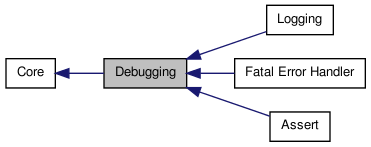
|
Modules | |
| Assert | |
assert functions and macros | |
| Fatal Error Handler | |
Functions to help clean up when fatal error is encountered. | |
| Logging | |
Logging functions and macros. | |
Defines | |
| #define | NS_ABORT_MSG(msg) |
| Abnormal program termination. | |
| #define | NS_ABORT_IF(cond) |
| Abnormal program termination if cond is true. | |
| #define | NS_ABORT_MSG_IF(cond, msg) |
| Abnormal program termination if cond is true. | |
| #define | NS_ABORT_UNLESS(cond) NS_ABORT_IF(!(cond)) |
| Abnormal program termination if cond is false. | |
| #define | NS_ABORT_MSG_UNLESS(cond, msg) NS_ABORT_MSG_IF(!(cond),msg) |
| Abnormal program termination if cond is false. | |
| #define | NS_BREAKPOINT() ns3::BreakpointFallback () |
| #define | NS_FATAL_ERROR_NO_MSG() |
| fatal error handling | |
| #define | NS_FATAL_ERROR(msg) |
| fatal error handling | |
Define Documentation
| #define NS_ABORT_IF | ( | cond | ) |
do { \ if (cond) \ { \ std::cerr << "aborted. cond=\"" << #cond << ", "; \ NS_FATAL_ERROR_NO_MSG (); \ } \ } while (false)
Abnormal program termination if cond is true.
- Parameters:
-
cond condition to be evaluated.
This is similar to NS_ASSERT(!(cond)), except this check is enabled in all builds. If cond is evaluated to true, the espression evaluating to true is printed to stderr, followed by a call to the NS_FATAL_ERROR_NO_MSG() macro which prints the details of filename and line number to stderr. The program will be halted by calling std::terminate(), triggering any clean up code registered by std::set_terminate (NS3 default is a stream-flushing code, but may be overridden).
This macro is enable unconditionally in all builds, including debug and optimized builds.
| #define NS_ABORT_MSG | ( | msg | ) |
do { \ std::cerr << "aborted. "; \ NS_FATAL_ERROR (msg); \ } while (false)
Abnormal program termination.
- Parameters:
-
msg message to output when this macro is hit.
This macro is essentially equivalent to NS_FATAL_ERROR, excepts it prepends the error message with the string "aborted. ". When this macro is hit a runtime, the program will be halted using std::terminate, which triggers clean up code regestered by std::set_terminate.
This macro is enable unconditionally in all builds, including debug and optimized builds.
- See also:
- NS_FATAL_ERROR
| #define NS_ABORT_MSG_IF | ( | cond, | ||
| msg | ||||
| ) |
do { \ if (cond) \ { \ std::cerr << "aborted. cond=\"" << #cond << "\", "; \ NS_FATAL_ERROR (msg); \ } \ } while (false)
Abnormal program termination if cond is true.
- Parameters:
-
cond condition to be evaluated. msg message to output when cond is true.
This is similar to NS_ASSERT_MSG(!(cond)), except this check is enabled in all builds. If cond is evaluated to true, the espression evaluating to true is printed to stderr, followed by a call to the NS_FATAL_ERROR() macro which prints the user-specified error message, and details of filename and line number to stderr. The program will be halted by calling std::terminate(), triggering any clean up code registered by std::set_terminate (NS3 default is a stream-flushing code, but may be overridden).
This macro is enable unconditionally in all builds, including debug and optimized builds.
| #define NS_ABORT_MSG_UNLESS | ( | cond, | ||
| msg | ||||
| ) | NS_ABORT_MSG_IF(!(cond),msg) |
Abnormal program termination if cond is false.
- Parameters:
-
cond condition to be evaluated. msg message to output if cond is false.
This is an alias for NS_ABORT_MSG_IF(!(cond))
- See also:
- NS_ABORT_MSG_IF
| #define NS_ABORT_UNLESS | ( | cond | ) | NS_ABORT_IF(!(cond)) |
Abnormal program termination if cond is false.
- Parameters:
-
cond condition to be evaluated.
This is an alias for NS_ABORT_IF(!(cond))
- See also:
- NS_ABORT_IF
| #define NS_BREAKPOINT | ( | ) | ns3::BreakpointFallback () |
Inserts a breakpoint instruction (or equivalent system call) into the code for selected machines. When an NS_ASSERT cannot verify its condition, this macro is used. Falls back to calling AssertBreakpoint() for architectures where breakpoint assembly instructions are not supported.
| #define NS_FATAL_ERROR | ( | msg | ) |
do \ { \ std::cerr << "msg=\"" << msg << "\", "; \ NS_FATAL_ERROR_NO_MSG(); \ } \ while (false)
fatal error handling
- Parameters:
-
msg message to output when this macro is hit.
When this macro is hit at runtime, the user-specified error message is printed to stderr, followed by a call to the NS_FATAL_ERROR_NO_MSG() macro which prints the details of filename and line number to stderr. The program will be halted by calling std::terminate(), triggering any clean up code registered by std::set_terminate (NS3 default is a stream-flushing code, but may be overridden).
This macro is enabled unconditionally in all builds, including debug and optimized builds.
| #define NS_FATAL_ERROR_NO_MSG | ( | ) |
do \ { \ std::cerr << "file=" << __FILE__ << ", line=" << \ __LINE__ << std::endl; \ ::ns3::FatalImpl::FlushStreams (); \ std::terminate (); \ } \ while (false)
fatal error handling
When this macro is hit at runtime, details of filename and line number is printed to stderr, and the program is halted by calling std::terminate(). This will trigger any clean up code registered by std::set_terminate (NS3 default is a stream-flushing code), but may be overridden.
This macro is enabled unconditionally in all builds, including debug and optimized builds.
 1.7.1
1.7.1